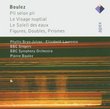| All Artists: Beethoven, Helsingborg Symphony Orchestra Title: Beethoven: Symphony No. 3 "Eroica" [Hybrid SACD] Members Wishing: 0 Total Copies: 0 Label: Harmonia Mundi Fr. Original Release Date: 1/1/2008 Re-Release Date: 3/11/2008 Album Type: Hybrid SACD - DSD, Import Genre: Classical Styles: Ballets & Dances, Ballets, Historical Periods, Classical (c.1770-1830), Symphonies Number of Discs: 1 SwapaCD Credits: 1 UPC: 093046747060 |
Search - Beethoven, Helsingborg Symphony Orchestra :: Beethoven: Symphony No. 3 "Eroica" [Hybrid SACD]
![Beethoven: Symphony No. 3 "Eroica" [Hybrid SACD]](https://nationalbookswap.com/cd//l/74/6074/6166074.jpg) | Beethoven, Helsingborg Symphony Orchestra Beethoven: Symphony No. 3 "Eroica" [Hybrid SACD] Genre: Classical |
Larger Image |
CD DetailsSimilar CDs
Similarly Requested CDs |
CD ReviewsAt last: a great modern recording of a great symphony. Lover of Fine Things | UK | 04/22/2008 (5 out of 5 stars) "The first minute of the symphony immediately distinguishes this recording; at once separating it from most others with a clarity of vision and understanding that continues to the symphony's end. The famous opening two strokes of the symphony are very precise and sharp, incisively commanding attention, leading onto a deliciously detailed and refined reading of the first movement. The use of vibrato is restrained, as one would expect from Manze, but is expressively used as needed to add to the enjoyment. The Helsingborg Symphony Orchestra is a small orchestra and this comes across to great benefit throughout this disc, with remarkably light and delicate playing. There is none of the relentless attack and thumping which seems to have become popular with other so called historically informed performances of Beethoven, an approach that can sometimes be over used and become tiring to the ear. The second movement is full of refinement, the tempi and pointing seeming to be perfect, with a funeral march that is noble and stately but never ponderous. Speeds throughout never seem fast, although the timings are fairly typical for this symphony; there is excellent forward momentum which never sounds rushed as it can in some Beethoven performances. Throughout this is a reading of exceptional clarity, which involves and gives immense enjoyment. It is also one of those discs that I have to keep playing and hearing again; it is rare that a recording has this ability to so continually fascinate the listener. As a conductor this disc must be Manze's finest recording achievement to date. Accompanying the symphony on this disc are twelve `contredances' and the finale from the ballet Creatures of Prometheus, these are not random choices made to fill up a disc, but are used to illustrate the genesis and development of the idea behind the symphony's finale. This might not attract the average listener, appearing to be too academic, but in fact they are very enjoyable pieces in their own right, played as well as the symphony, and a splendid alternative coupling. Manze provides a very informative and readable note, which describes the history of the symphony when it was composed and first played, relating the additional pieces on this disc to the symphony. Informatively, he also lists his own version, with timings, of the `SOGs' or `strokes of genius' that populate this great symphony. Very good recording quality, listening to its SACD MCH layer, although not one that amazes. There is an excellent of spread of instruments between the front speakers and a reasonable depth to the image. The sound detail is clear and natural with each instrument precisely and lucidly placed within the image. The packaging is Harmonia Mundi's usual digipak with a loose booklet. Although we do not need another Beethoven symphony cycle on SACD, I very much hope that this becomes one. " A Curate's Egg Virginia Opera Fan | Falls Church, VA USA | 04/05/2008 (3 out of 5 stars) "The Eroica performance reminds me of the British cartoon where an ill at ease curate is having breakfast in his bishop's home. The bishop says "I say, you seem to have gotten a bad egg." The curate replys "I assure your grace that parts of it are excellent." So it is with Manze's Eroica based on a couple of listenings. His nearly 17 minute traversal of the opening movement (including exposition repeat) is careful, nicely played, and lacking in the headlong impetuosity that should inform this revolutionary music. For comparison, I turned to Osmo Vanska's recent BIS offering and was surprised to see an almost identical timing for the movement. The BIS performance certainly sounds more urgent. Things don't improve much with the rather ponderous account of the Funeral March. I found my attention wandering, something that almost never happens when I listen to this music. Somewhat surprisingly, things come alive with the Scherzo. It doesn't embody the sense of barely restrained power that is evident in the best accounts of the movement, but it is certainly more urgent that what has gone before. The overall effect improves considerably with a dashing account of the Finale. The Twelve Contretaenze are well played, but hardly top drawer Beethoven. The finale from the Prometheus ballet music is also nicely played and points up the thematic connections between the ballet and the Eroica finale. The disc is nicely recorded in the SACD format with a good sense of room ambience. On SACD, I prefer the Vanska Eroica mentioned earlier. For standard redbook CD, I hold an abiding enthusiasm for Mackerras' taut and well played account of the symphony on EMI. Like the curate's egg, Manze' performance is excellent in part, but I consider it an also ran." A revolutionary symphony created out of dark personal turmoi Mike Birman | Brooklyn, New York USA | 05/27/2008 (5 out of 5 stars) "Beethoven had just been handed the worst medical diagnosis a musician should ever be forced to confront (short of complete destruction): a protracted decline in auditory proficiency leading to total deafness. As he monitored his loss of hearing acuity, a deep and profound depression compelled him to contemplate suicide in the years 1802-1803. The previous decade had seen him slowly assume the mantle of Europe's greatest living composer, this putative title taken from the previous holder of the distinction: the aging Franz Joseph Haydn. Haydn had recently ceased composing following his inability to complete the Quartet No.68 in D Minor, Op.103, Hoboken No.III:83 (incomplete), now nothing more than a two-movement torso. The inexhaustible Haydn was finally exhausted. Though the great man had once been Beethoven's composition teacher, their personalities clashed and the older master often referred to the younger, more head-strong composer as "the great mogul". Beethoven had recently published his masterful first set of string quartets, the six quartets labeled Opus 18. Though heavily influenced by Haydn, and retaining much in the way of traditional technique and style, there were enough disquieting notes of modernity to discomfort the elderly Haydn and, as he had done when confronted by Mozart's revolutionary operas and piano concertos, he retired from the genre, ceding the form to his younger protege. Beethoven had already written his first two symphonies, also under the shadow of Haydn's great achievement in the form, both of them stretching boundaries but still well-grounded in the historical precedents set by Haydn and Mozart.
Beethoven confronted deafness with a shout of rage and a fierce determination to defeat fate. It was in this defiant mood that he composed the Symphony No.3 'Eroica' in E-flat Major Op.55, the single-most revolutionary instrumental composition ever written, in the opinion of many musicologists. Its first movement, alone, was as long as most 18th Century symphonic works. Emerging from his dark suicidal depression, Beethoven chose life and art over death, embraced the ideas of heroism and the artist's unique destiny, and linked himself to another great contemporary hero, Napoleon. Beethoven initially dedicated the symphony to him, but famously eradicated his name from the title page when Napoleon declared himself emperor. The savage erasure on that title page makes for a striking cover to this excellent CD's enclosed booklet. Andrew Manze doffs his violinist's cap and conducts the modern instrument Helsingborg Symphony Orchestra. Their performance sounds almost as if it utilized period instruments: the complex inner lines of Beethoven's masterful orchestral writing are presented with such clarity and precision. Vibrato is minimized, tempos are swift, most of the 19th Century accretions to this epochal masterpiece are eliminated. This is a fresh performance, performed as if Mr. Manze had recently discovered this work while sifting through a music library. The first two movements exhibit a moderate tempo, ceding a significant degree of urgency in favor of a large measure of grace and power. I initially missed the elemental urgency provided by traditional conductors such as Karajan and Bernstein, requiring several repeated hearings before comfortably entering Manze's vision of the piece. Once I grasped his intentions, I found the performance stirring and elegant. The third movement Scherzo has all of the old urgency of expression and interpretive force, suggesting that Manze's vision of the first two movements is purposeful, not accidental. The finale retains all of Beethoven's dance-like, convulsively motorized expressiveness, in the process forging a metaphor for triumph over despair. It is splendidly performed, the energy never flagging, its excitement always evident, tugging at the very fabric of the form. Manze cleverly includes both of the previous incarnations of the movement: in the seventh of the 12 Contretanze and the finale of the ballet music, The Creatures of Prometheus. One can follow Beethoven's development of an idea from a small seed to its ultimate apotheosis. Although it took repeated listening, Andrew Manze's fresh vision of this iconic symphony awakened new appreciation for its greatness. The Eroica rewards listening to many versions and this ought to be one of them. Harmonia Mundi's SACD hybrid-multichannel sound is clearly defined, nicely atmospheric and reveals many orchestral lines that are often lost or muddied in other recordings. Mike Birman" |






![Seussical [2000 Original Broadway Cast]](https://nationalbookswap.com/cd//m/02/4802/514802.jpg)